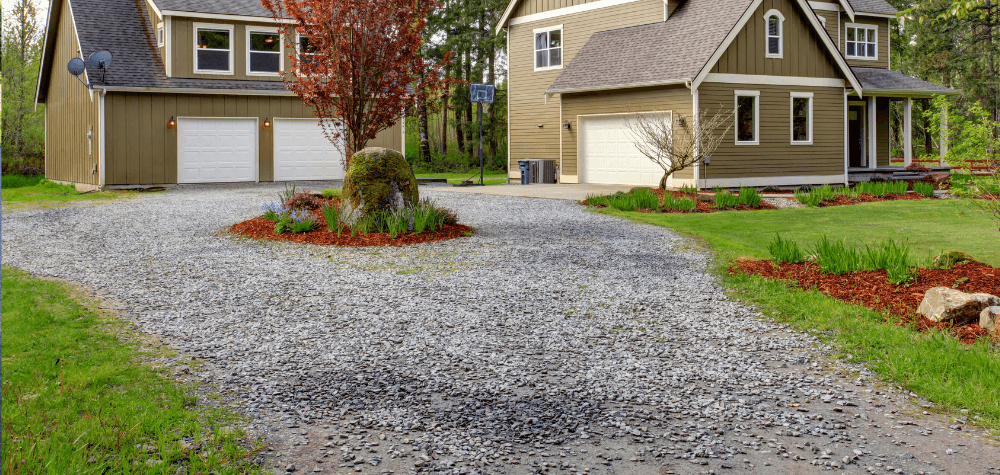Asphalt Paving vs. Gravel Driveways: Which is Best for Your Home?
When considering a new driveway, the decision often boils down to paving vs. gravel. Both options have their unique benefits and drawbacks, and the right choice depends on your specific needs, budget, and preferences. At Productive Asphalt, we know that a well-informed decision leads to better satisfaction and a more functional driveway. Here’s a comprehensive comparison of asphalt paving and gravel driveways to help you decide which is best for your home.
The Basics: Understanding Paving vs. Gravel
Gravel driveways are made up of loose, small stones spread across a prepared surface. On the other hand, asphalt paving involves applying a mixture of aggregates and bitumen to create a smooth, durable surface. While both options can make a functional driveway, their differences become evident in cost, maintenance, durability, and appearance.

1. Initial Installation Cost
Cost is often a deciding factor when choosing between paving vs. gravel. Gravel driveways are typically less expensive upfront. The cost of materials is minimal, and installation often requires less labor and equipment. Gravel may seem like the obvious choice for homeowners on a tight budget.
However, asphalt driveways, while having a higher initial cost, provide better long-term value. Asphalt requires professional installation and involves precise preparation and layering to ensure durability. Many homeowners find asphalt worth the investment despite the upfront expense due to its longevity and low maintenance needs.
2. Maintenance and Upkeep
In the paving vs. gravel debate, maintenance plays a significant role. Gravel driveways require frequent attention to keep the surface level and prevent ruts or potholes from forming. Rain and vehicle traffic can displace gravel, so you may need to regularly replenish the surface.
Asphalt, on the other hand, requires much less maintenance. Periodic sealcoating every 2-3 years helps maintain its durability and appearance. Minor cracks can be repaired easily with sealant, and the smooth surface prevents issues like water pooling, making it a low-maintenance option overall.
3. Durability and Longevity
Durability is another critical factor when deciding between paving vs. gravel. Gravel driveways are less durable, especially in areas with heavy rainfall or snow. Gravel can wash away, shift, or develop uneven spots over time, leading to a surface that needs frequent attention.
Asphalt driveways, when properly installed and maintained, can last 20-30 years or more. Asphalt is resilient to various weather conditions, including freezing and thawing cycles, making it an excellent choice for homeowners in climates with harsh winters. Its durability over the long term often outweighs the initial cost difference.
4. Appearance and Curb Appeal
Curb appeal matters, especially if you plan to sell your home in the future. In terms of aesthetics, asphalt paving offers a sleek and professional look. Its smooth, black finish complements most architectural styles and provides a clean, polished appearance.
Gravel driveways, while more rustic and natural, may not appeal to all homeowners. They can look messy over time, particularly if the gravel is uneven or displaced. For those prioritizing a neat and modern aesthetic, asphalt is the clear winner in the paving vs. gravel comparison.

5. Weather Resistance
Weather resistance is crucial for driveways, as exposure to the elements significantly affects their longevity and performance. Gravel driveways are prone to erosion during heavy rains, and snow removal can be challenging. Gravel often gets displaced by shovels or snowplows, requiring constant re-leveling after winter.
Asphalt driveways are much more weather-resistant. Their smooth surface allows for easy snow removal, and proper drainage systems prevent water from pooling or seeping into the surface. Asphalt is also better at handling freezing and thawing cycles, reducing the risk of cracks and damage.
6. Environmental Impact
For environmentally-conscious homeowners, both options have pros and cons. Gravel driveways use natural materials and require less energy for installation, making them a more eco-friendly choice initially. However, gravel can contribute to dust and sediment runoff into local waterways.
Asphalt driveways, while requiring more energy during production, are recyclable. Old asphalt can be reclaimed and reused in new projects, reducing waste and environmental impact over time. When comparing paving vs. gravel, consider the long-term environmental implications of each material.
7. Noise and Comfort
Another often-overlooked factor in the paving vs. gravel decision is the noise and comfort of the surface. Gravel driveways can be noisy, as vehicles crunch against the stones. Additionally, loose gravel can make walking or biking more challenging, especially for children or elderly family members.
Asphalt offers a quieter and more comfortable surface for both vehicles and pedestrians. Its smooth finish reduces noise and provides a safer, more stable walking path.
Which is Right for Your Home?
The decision between paving vs. gravel ultimately comes down to your priorities. If you’re looking for a low-cost option and don’t mind frequent maintenance, gravel may suit your needs. However, if you want a durable, low-maintenance driveway with a clean appearance and long-term value, asphalt paving is the superior choice.
Trust Productive Asphalt for Your Driveway Needs
At Productive Asphalt, we specialize in high-quality asphalt paving tailored to your specific needs and budget. Our experienced team ensures every driveway is professionally installed to withstand the test of time. Whether you’re upgrading from gravel or starting from scratch, we’re here to deliver reliable and lasting results.
Contact us today to learn more about your options and get a free quote for your driveway project. Let us help you choose between paving vs. gravel and transform your driveway into a feature you’ll love for years to come!







